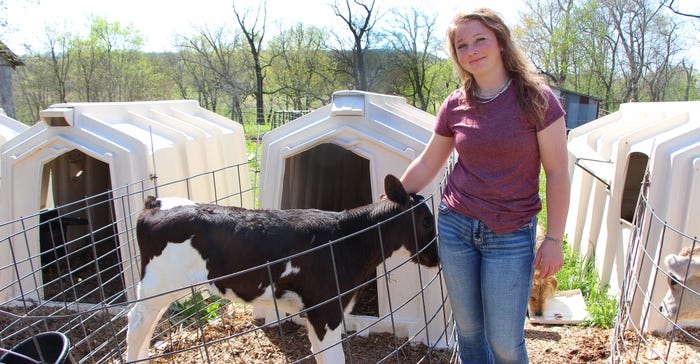
A red and white Guernsey dairy calf runs to welcome Lila Wantland into the pasture. As the third-generation dairy farmer reaches out her hand, the calf’s long tongue offers a slimy greeting.
“We just weaned her off the bottle,” Wantland explains, “so she’s a little needy.”
In the hills of southern Missouri, just outside of the small town of Niangua, the high school FFA member offers a tour around her family’s dairy operation, which consists of milking primarily Holstein cows. As part of her Supervised Agricultural Experience, or SAE project, Wantland takes care of the young calves and works alongside her family in the 80-cow dairy operation.
For her efforts, Wantland won the Missouri FFA Dairy Production Entrepreneurship Proficiency Award at the 94th Missouri FFA Convention in April.
Camps offer dairy experience
Wantland’s family operated a small dairy farm. Like many young kids, her love of the industry started at a young age in the show ring.
“I was 3 when I first started showing,” she says. She exhibited at local fairs, but soon Wantland, along with her sister, started traveling to the Missouri State Fair and then nationally to the North American International Livestock Exposition in Louisville, Ky.
Fellow dairy producers stepped in to help the sisters find success during the early years. “It was so nice to have fellow dairy farmers offer to help mentor us through the process,” Wantland explains. “We couldn’t have done it without that type of support.”
But she also notes the influence one dairy cow camp had on her dairy cattle show career. It was a three-day camp offered by Missouri 4-H.
“There is a group of 20 heifers and 40 kids,” Wantland explains. “You have a partner, and you pick a heifer. This heifer typically has never been a halter or ever been shown or clipped. Your job for those three days is to break her to lead, learn to clip and finally participate with her in the showmanship competition on the last day.”
The camp also teaches how to judge cattle, properly get them vaccinated and identify the parts of a dairy cow. “For a young person, it is a lot of information,” Wantland notes, “but you learn a lot about dairying over the years.” The University of Missouri Extension still sponsors the Missouri 4-H Dairy Cow Camp.
While she started in 4-H, like many raised in rural areas, Wantland entered FFA. It was there she expanded on her showmanship skills and dairy knowledge, which led her to take on more operational responsibilities at the farm.
FFA builds on dairy knowledge
Wantland milks cows and keeps records for her own and the family operation. During the school year, she splits the twice-a-day milking schedule with her father, who takes the morning shift. In the summer, she manages to milk both morning and evening shifts.
Of the 80 total cows on the family farm — including replacement heifers, show cattle and calves — the milk cows are a small portion, consisting of just 35 cows. Wantland owns all the milk cows, and over the years has made additions to the traditionally Holstein-influenced herd.
Through showing dairy cows, the Niangua FFA member partnered with other breeders who raise Brown Swiss, Jersey and Guernsey. Wantland enjoyed working with these breeds and incorporated these different genetics into her own cow herd.
Wantland retains ownership of the female calves bringing them back into the herd, while selling the male calves. But marketing calves or milk is not always easy.
Marketing skills put to test
As a young dairy producer, Wantland has already endured the highs and lows of dairy prices. When COVID-19 hit, selling dairy calves was difficult. “If you took them to the sale barn, they wouldn’t bring much money,” she explains.
Then there was the dumping of milk during the COVID-19 pandemic. “Our co-op was still able to take our milk, but some of our neighbors could not have their milk picked up,” she says. “It was a tough time.”
Despite the roller coaster ride of the dairy industry, Wantland still loves being a part of it. In the fall, she will leave the family farm briefly to attend Oklahoma State University and major in animal science. However, she notes, dairy farming is rooted in her life.
“I enjoy the calves and really all aspects of it,” she adds, as the young calf continues nudging at her leg. “I definitely see being involved in a dairy farm in my future.”
State placement proficiency award winner
Jace Jensen of Conway won the Missouri FFA Dairy Production Placement Proficiency Award.
A senior at Laclede County R-I High School, Jensen’s SAE consists of working for Huckaby Farms, a dairy cattle operation. He milks the dairy cattle every day and says he is fortunate to still be able to milk with the shortage of small family farms in his area.
After graduation, Jensen plans to study criminal justice in college, with hopes to become a conservation agent. He wants to have a farm of his own to use his knowledge in the milking industry.
Proficiency awards recognize FFA members who excel as agricultural entrepreneurs, employees or volunteers while gaining hands-on career experience. Dairy Production Entrepreneurship is one of 48 proficiency award areas recognized at the state level. Midwest Dairy Association sponsored this award.
Read more about:
Next GenerationAbout the Author(s)
You May Also Like






